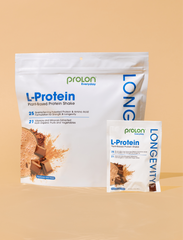
7 Myths (and Facts) About Your Metabolism
Key takeaways:
-
A “fast metabolism” does not always mean you’re in good metabolic health.
-
Age-related hormone and lifestyle shifts are more likely to cause weight gain in mid-life than a “slowing” metabolism.
-
Lean muscle mass is vital for a healthy metabolism.
-
Preserving muscle, choosing a nutrient-dense diet with plant-based protein, and addressing age-related hormone changes can support more efficient metabolism and longevity.
Metabolism is one of the most talked-about, yet least understood, processes in the body. It’s often blamed for weight gain, praised for weight loss, or treated like a switch you can simply turn on or off. The truth, however, is far more nuanced. By understanding how your metabolism, and metabolic health, really work, you can separate fact from fiction and discover practical ways to support it for your long-term health.
Here, we’ll take a look at some common metabolism myths to get to the bottom of how your metabolism really works every day on our behalf.
Myth: Metabolism is how all about how fast or slow you burn energy
While the rate at which your body burns food for energy is certainly a part of metabolism, it’s not the whole story. Metabolism refers to how your body converts food into energy, to then fuel all of your body’s essential processes.
More accurately, metabolism encompasses all of the food-to-fuel chemical reactions that keep you alive. Therefore, it also contributes to the other metabolic processes that keep you breathing, thinking, and moving. Your overall metabolic health is how efficiently your body is able to use the energy metabolism creates to regulate functions like blood sugar, blood pressure, and body fat.
Myth: Eating certain foods can dramatically speed up metabolism
Have you ever heard that eating more cayenne pepper, for example, can supercharge your metabolism, and help you lose weight? While capsaicin, a compound in cayenne, may create some heat in the body that increases your metabolic rate, its effects on overall metabolism are very minor.
How quickly or slowly you metabolize food (your daily metabolic rate) is determined by your basal metabolic rate, physical activity level, and the thermic effect of your food.
All three of these things comprise your total daily energy expenditure (TDEE), or the number of calories your body burns in a day:
-
Basal metabolic rate (BMR), the number of calories you burn at rest for vital functions like breathing, brain function, and heart rate.
-
Physical activity level (PAL), the energy you use for movement like exercise and everyday activities.
-
Thermic effect of food (TEF), the energy required for digesting and absorbing nutrients from food, as well as transporting those nutrients to your cells through the bloodstream.
Some of these three things are determined by genetics, age, and gender, but other factors can influence the speed of your metabolism too. For example, weight training and resistance workouts tend to burn many more calories at rest. In addition, while the impact of a food like cayenne may only be slight, a regular diet that includes lean protein, fiber, legumes, and leafy greens requires more energy to break down than a diet that’s high in sugar and fat. As a result, these more intentional and long-term nutrition adjustments are more likely to affect your metabolic rate in a meaningful way than any one specific food.
Myth: Metabolism dramatically slows down after 40
This is a big one. Because many people have directly experienced weight gain as they get older, there’s been a widespread assumption that metabolism slows as we hit our 40s. However, recent research suggests that this may not be strictly true.
Metabolism likely stays relatively stable from early adulthood until about age 60, when it then gradually begins to decline.
Studies show that TDEE remains about the same from 20 to 60 years old; adults 90 years and older demonstrate an average 26% reduction in TDEE as compared to those in their 60s. While the slow decline of metabolism in older adults may be in part due to reduced physical activity and muscle loss, age-related reduction in organ function is also a contributing factor.
Why is this important? Many middle-aged adults perceive midlife weight gain as the result of metabolism slow-down, when in fact, it’s more likely due to certain lifestyle changes, reduced muscle mass, and/or the onset of age-related hormone shifts.
Hormonal changes can affect the amount of energy your body expends, which in turn, alters your daily metabolic rate. Recognizing this can empower you to take action now to better manage things like chronic stress levels, lack of exercise, and getting enough sleep, in addition to addressing any age-related hormonal changes that may be contributing to mid-life weight gain.
Myth: Calorie restriction and fasting can cause you to gain weight
It may sound counterintuitive, but there is an unfounded theory that if the body gets accustomed to receiving fewer calories, it will stop burning them altogether, potentially causing you to stop losing weight, or even gain weight. However, your body’s “starvation mode” response, or adaptive thermogenesis, doesn’t just turn off your ability to lose weight. Rather, it’s a natural biological shift triggered by reduced caloric intake that's designed to conserve energy by limiting, not stopping, the amount of calories it burns.
While calorie restriction can cause some metabolic adaptation that may slow the loss of fat, weight loss will still continue as long as a calorie deficit remains.
If your weight loss plateaus, it’s often because your body is wired for survival; in response to what it perceives as a threat of starvation, it conserves energy by slowing the rate at which it burns calories. Nevertheless, the idea that fat loss simply stops (or reverses) at a certain point in a calorie-restricted state is untrue. In fact, the only way you might gain weight during a calorie deficit is if you choose to overeat as a result of certain common fasting side effects: feelings of excessive hunger, irritability, and increased food cravings. Just think of your metabolism as a spectrum that adapts to meet the changing needs of your body; when it receives fewer calories to fuel its processes, it will prioritize the jobs that are most vital to your survival, and if it receives too many calories to fuel its needs, it will store the excess as fat.
In fact, fasting, including methods like intermittent fasting and prolonged fasts like the 5-Day Fasting Mimicking Diet (FMD), has been shown to cause certain metabolic shifts that support metabolism. This is because some of the processes triggered during the fasting state may help contribute to a more effective metabolism. They include:
-
Autophagy, the body’s cellular cleanup mechanism
-
Ketosis, the switch from using glucose as fuel to using stored fat
-
Lowered blood sugar levels, which may then support enhanced insulin sensitivity
Myth: All weight loss is good weight loss
Many fad diets and GLP-1 drugs may lead to weight loss, but much of that weight can come from muscle. Preserving lean muscle is vital for achieving healthy weight management that actually lasts, since carrying less of it can lead to a slower, less efficient metabolism over time. As a result, weight regain is not uncommon, and often leads to a lifetime of fluctuating weight, or monthly dependence on costly injectable drugs.
Losing muscle weight is not good for metabolism. Lean muscle mass burns more calories at rest than fat, so increasing the amount you maintain actually helps boost metabolism, even if it weighs more.
As we age, our bodies also tend to lose muscle, which is important for optimal glucose regulation and insulin sensitivity. This, in addition to age-related hormone shifts and lifestyle changes, are just a few of the ways the natural aging process can impact our metabolic health, making you more vulnerable to conditions like diabetes, metabolic syndrome, and cardiovascular diseases later on. By understanding this muscle-metabolism connection, however, you can take steps now to counteract some of the effects of aging—adding resistance and weight training exercises into your routine, optimizing your daily nutrition, and reducing your chronic stress levels are great places to start!
“Muscle is far more than strength. It’s one of the body’s most metabolically active organs. It acts as a glucose reservoir, helps regulate insulin sensitivity, and supports mitochondrial function, all of which are essential for long-term metabolic health. Protecting lean muscle through nutrition and movement isn’t just about body composition, it’s about protecting one of the key drivers of longevity itself.” -Melanie Murphy Richter, MS, RDN
What are some other ways to boost your metabolism?
Research shows that metabolism only gradually slows after the age of 60, and that certain calorie restriction and fasting protocols may actually support a healthy metabolism. Let’s look at some of the other factors that may help or hinder your metabolic rate:
-
Daily lifestyle and physical activity: Exercise, particularly resistance training and HIIT (high intensity interval training) can positively impact metabolism over time, since building and maintaining muscle mass helps your body burn more calories, even at rest. Being more intentional about your non-exercise activity too can contribute to the daily caloric burn; things like walking, standing, cleaning, and taking the stairs instead of the elevator are small actions that add up to make a difference in daily energy burn.
-
Body type and composition: Taller and larger-framed bodies tend to burn more calories per day than shorter, more petite ones. Since we know that lean muscle is more calorically active even at rest, however, prioritizing ways to stay strong and lean can help boost your metabolism, regardless of body size.
-
Hormone changes: Age-related hormone shifts that occur during menopause (decline in estrogen and progesterone production for women), andropause (decline in testosterone), adrenopause (decline in adrenal hormones), and somatopause (decline in growth hormones) can affect metabolism. These hormone changes are often linked to things like gradual weight gain, loss of muscle mass, and reduced insulin sensitivity, which can interfere with the body’s ability to metabolize nutrients. In addition, thyroid hormones and function (responsible for regulating your BMR and metabolic speed), can also decrease with age. It’s a good idea to consult your medical provider if you think any of these hormonal changes are affecting you.
-
Diet and nutrition: Even if your calorie intake isn’t excessive relative to your daily caloric needs, if your daily diet is higher in sugar and highly processed foods than in nutrient-dense whole grains and fresh vegetables, it’s likely limiting your metabolism’s ability to efficiently convert food into high quality energy. Protein also has the highest thermic effect since digesting it burns more calories than other types of food. Consider incorporating a plant-based protein for added metabolism and longevity benefits, such as L-Protein, scientifically designed to supply the optimal amount of protein needed to support muscle health without overstimulating pro-aging pathways.
-
Sleep and stress: Poor sleep quality and high levels of chronic stress can disrupt essential hormones that affect metabolism. For example, cortisol, the body’s stress hormone, also helps regulate blood sugar and influences how the body stores fat. Lack of sleep can also trigger an increase in ghrelin, the hunger hormone, while lowering leptin, the hormone that signals fullness. This imbalance can drive cravings for high-calorie, less nutritious foods and make it harder to manage weight.
-
Temperature exposure: Did you know that shivering when you’re cold is a big calorie-burner? Cold temperatures activate brown fat, a special type of fat that burns calories to generate heat, helping you conserve energy and stay warm. Cold plunges, or even occasional winter walks, are simple ways to tap into this process and support your metabolism.
Prolon helps support—and reset—your metabolism
With so many weight loss options available, it’s important to be sure you’re not only making decisions that will support your metabolism, but also enhance your overall metabolic health and longevity. The Prolon 5-Day Fasting Mimicking Diet (FMD) is clinically shown to protect lean mass while targeting visceral fat and reset your metabolism—while also supporting long-lasting metabolic health. Incorporating quarterly cycles of the FMD, along with lifestyle and nutrition principles rooted in the Longevity Diet between fasts, can be a great way to empower healthy aging and everyday vitality.
While metabolism isn’t something you “solve” overnight, the most effective thing you can do is to protect it with daily action and positive lifestyle choices today. Prioritizing muscle maintenance, regular physical activity, and healthy nutrition are powerful tools for enhancing and preserving your metabolism so it can continue to work hard for your health for years to come.
Sources:
Cleveland Clinic. “Brown Fat.” Website.
Cleveland Clinic. “Thyroid Hormone.” Website.
National Library Of Medicine. National Center For Biotechnology Information. “Adaptive thermogenesis in humans.” Website.
National Library Of Medicine. National Center For Biotechnology Information. “Age-related variation in thyroid function – a narrative review highlighting important implications for research and clinical practice.” Website.
National Library Of Medicine. National Center For Biotechnology Information. “Fasting-Mimicking-Diet does not reduce skeletal muscle function in healthy young adults: a randomized control trial.” Website.
National Library Of Medicine. National Center For Biotechnology Information. “Fat-free mass is maintained in women following a moderate diet and exercise program.” Website.
National Library Of Medicine. National Center For Biotechnology Information. “Hormonal and Metabolic Changes of Aging and the Influence of Lifestyle Modifications.” Website.
National Library Of Medicine. National Center For Biotechnology Information. “Intermittent Fasting and Metabolic Health.” Website.
National Library Of Medicine. National Center For Biotechnology Information. “Moderate exercise attenuates the loss of skeletal muscle mass that occurs with intentional caloric restriction-induced weight loss in older, overweight to obese adults.” Website.
Science. “Daily energy expenditure through the human life course.” Website.












